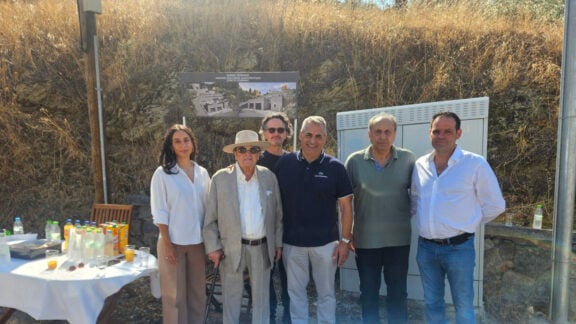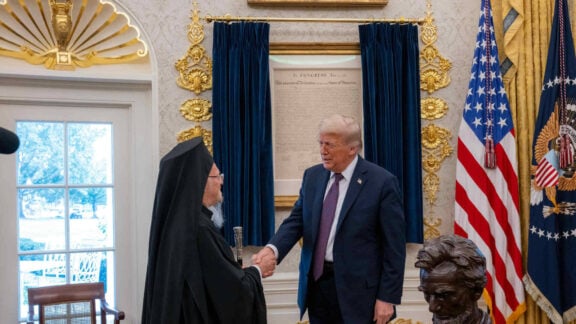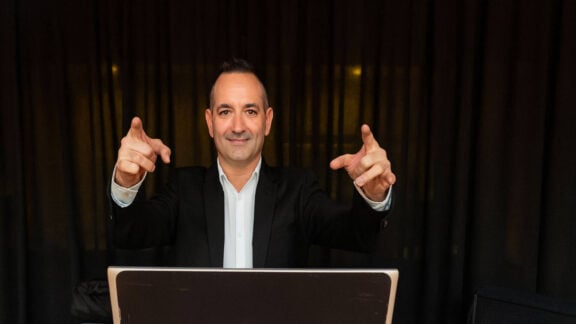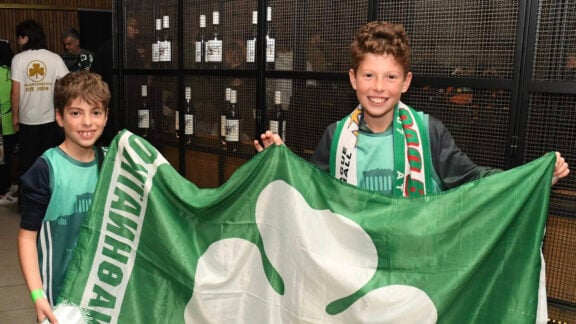Neos Kosmos celebrated its 60th birthday this year. It was in 1957 that one of the longest serving and the largest-selling ethnic newspapers Down Under published its first ever edition, at the time a four-page edition that grew and multiplied to two Greek and one bilingual edition on a weekly basis.
What started as a means to document the struggles of the first Greek Australian migrants in Australia and help them preserve their ties to the motherland, has had to adapt and evolve into one of Australia’s most influential multicultural media. And while other media publications are falling by the wayside due to the rise of the internet, Neos Kosmos has tackled online global immediacy head-on by giving readers up-to-date and topical news through high quality and objective journalism.
From its first days, Neos Kosmos connected migrants and helped them share their everyday reality, issues and sociopolitical predicaments in a relatable manner, and in their own language. It became the voice of the Greek Australian expat, not only reporting but claiming basic human rights and demanding to be heard by the political and social elite of Australia and Greece respectively.
For the second generation, however, this newspaper – even though it has always had a place in their childhood memories – was never the newspaper that was born to voice and cover their needs. It was always their parents’ newspaper, perceived to be a token of the old generation sitting on the family coffee table to inform the eldest of the family of the upcoming mnimosina and funerals. While in their young years most of our second generation readers belonged to that ‘lived’ their own rebellion under the motto “our parents, their mentality, and anything that has to do with their world needs to be avoided”. Meanwhile, Neos Kosmos being published in the Greek language, did not gauge their interest.
They never would have imagined a day would come when that newspaper of the ‘old’ could and would cover some of their own needs; needs they didn’t even know existed.
And here we are, hearing the stories of three successful Greek Australians for whom Neos Kosmos, was a token planted in their early memories without them realising, and just like that from ‘the book of the dead’ it became the ‘book that asserted their success and helped them rise up in the eyes of their parents and families’; the ‘book’ where they gathered up the courage to own up to their life choices; and, for some, the ‘book’ that made them known outside the Australian borders.
Three of those second generation Greeks managed to stand out, not just within the limits and limitations of the Greek community but nationwide, carefully, yet randomly, selected interviewees Mercury Megaloudis, Maria Katsonis, and Helen Marcou share their personal Neos Kosmos experiences.
MERCURY MEGALOUDIS: MONTHS AFTER THE ARTICLE WAS PUBLISHED, PEOPLE WOULD COME UP TO ME MENTIONING IT
Mercury Megaloudis is a bouzouki player and has been dubbed one of Australia’s most passionate photographers with over 34 awards under his belt, six from the Australian Institute of Professional Photographers, naming him AIPP Photographer of the year. The academy also awarded Mercury his Grand Masters, a very prestigious title, considering their are only a handful of people who have that honour. More than 10 of his awards come from international competitions, while he is also the first Greek Australian photographer to win the Best Australian Wedding Photography Award, with a photo series of a Greek couple tying the knot in Macedonia. Megaloudis is also a photography tutor. He grew up in a Greek home but hadn’t properly come into his Greek identity; prior to visiting Greece that is. It was when he experienced the true vibe of the motherland that he became interested and pursued a connection with his heritage.
“As a kid, Neos Kosmos was always in my house. My parents bought the paper all the time; it was part of the furniture. I did not read it as I have never gone to Greek school and I cannot read Greek, yet always looked at the pictures as I was an aspiring photographer from a young age. It was mainly pictures of people enjoying themselves and I remember always trying to spot someone I knew.
I was very proud when you contacted me to ask me for the interview. I see the Greek community as a jigsaw puzzle [in which] everyone is one little piece; you know, a mosaic and everyone has got a little colour that makes the big picture. That’s the way I see it.
I had never really gone public about the extent of my work. The response was great both from the Greek community in general and my family in
particular; they were proud for months. I was impressed with the impact it had on people. For months after the article was published, I would be going out and people would approach me and mention having read the article. It raised the bar, they thought ‘Wow, he made it to the Greek paper’.
For the Greek Australian community and my folks it was a kind of legitimisation of what I was achieving. I started to feel more Greek, even more so after I visited Greece. I discovered that even the people in Greece really appreciate Neos Kosmos; it was for them the link to understand how big the Greek community in Melbourne really is and Neos Kosmos subsequently became very important to them. I myself developed a lot of respect for this paper and I am proud to have been featured in it. “
MARIA KATSONIS: I FELT IMPORTANT BUT VERY VERY NERVOUS
Maria Katsonis is a senior executive in Victoria’s Department of Premier and Cabinet and is the former director of DPC’s equality portfolio, the first of its kind in Australia. Katsonis’ work often involves projects including social policy, diversity, and inclusion. She teaches policy design and implementation at the Melbourne School of Government, Melbourne University and is an advocate for mental health against family violence and an accomplished writer. In her first book, ‘The Good Greek Girl’ she became one of the first Greek Australian women to openly voice their sexuality. Katsonis is a beyondblue ambassador and a founding member of Open Minds. In 2016 she was named as one of The Australian Financial Review 100 Women of Influence.
“I have very nostalgic memories of Neos Kosmos from growing up. My yiayia lived with us and her English was very limited. She came out in the 1950s and when I went to high school, I would go to Lonsdale Street and would get Neos Kosmos and Ellinis magazine for my family as an artifact of the Greek community.
It didn’t have huge personal relevance to me. Not at the time. Even though I’m a Greek girl I didn’t go to Greek school so my reading and writing is very poor. My dad home-schooled me a bit so I’ve never read the newspaper in its Greek form other than to keep up with the obituaries section. It was like an anchor, a community token. My dad bought it and because my mum used to work for the consulate Neos Kosmos was always around. The social events page, such a huge part of the fabric of my growing up. I didn’t however connect with the newspaper itself until the English edition came out.
My relationship with Neos Kosmos later in life has proven really significant for me.
There is not just one Greek community if I may say, there are several Greek communities that make up what we call the Greek community here in Australia, but I personally have always felt a bit outside, because of my kind of trajectory, my rebellion. When Neos Kosmos asked to interview me for the first time when I published Good Greek Girl, it was really significant for me to kind of reconnect with this community group that has been so formative in my background whilst growing up. And here I was, being part of that paper now.
In my book, I came out and talked about the stigma within the family and the cultural stigma of LGTBQI people in our community. Speaking to Neos Kosmos, knowing that I have been talking to this specific community did make me nervous and a bit apprehensive at first to be honest.
I realised that quite a few people I know within the community would read it and I was a bit conscious about the impact my sexual orientation might have had on the family name. I knew that the newspaper would be read by contemporaries of my town, but I had to do it and take this step for myself if I wanted to be truly authentic to the kind of story I wished to tell about myself.
In the same way that the book deals with the taboo of mental illness, I had to deal with the stigma of being a Greek migrant and LGBTQI person. There is still a stigma.
Neos Kosmos kind of forced me into being a role model; I hadn’t realised people would reach out. It has re-framed people’s perceptions and I received very strong messages of support. It’s changed my perception as well. Neos Kosmos also strengthened my connection with the Greek community and I have a very strong relationship with the paper since then. As a result of that, it has really strengthened my relationship with the Greek readership in terms of my work.”
HELEN MARCOU: NEOS KOSMOS VALIDATED MY WORK IN THE EYES OF MY PARENTS
Helen Marcou is not only the co-founder of the Save Live Australia’s Music (SLAM) movement and co-owner of the venerated Bakehouse Studios in Melbourne, she is one of the most renowned music community activists, and inducted to the Victorian Government’s 2017 Victorian Honour Roll of Women. Marcou has gone down in history as the woman that organised the largest ever cultural protest; her SLAM movement literally saved many Melbourne live music venues from oblivion. Since then (2010), ‘Helen of Fitzroy’ has trailblazed a series of changes in the live music industry and had its contribution to the country’s economy acknowledged whilst promoting policies to fight sexual harassment at venues. In 2015, Helen was instrumental in the formation of the Victorian Government’s ‘Sexual Assault and Harassment of Women in Licensed Venues Taskforce’. ‘Rolling Stone’ magazine listed her amongst the most influential women in Australia in 2010 and she won ‘The Age’ EG Award’s first-ever prize for outstanding achievement for services to the music community. Even though she is one of the most famous Australian personalities and has been interviewed by dozens of publications and media, she says that her experience with Neos Kosmos was special.
“Growing up for me Neos Kosmos was always there. It was the family paper, they would have it around the house once or twice a week. For me, it was always ‘their’ paper and it was always described as ‘their’ paper. The first time Penni Pappas contacted me to interview me, I was blown away with her knowledge on music and culture and it was something of a surprise for me to realise that there were people so young and connected working for Neos Kosmos. For me, it was the old world paper, and so, to have such a young and modern person work there came as real surprise. I read very limited Greek, I was therefore disconnected from the paper.
I thought that it was a connection to the ‘old world’. I had this predisposition or this bias that it was a very conservative paper but that was because of the readership. I didn’t understand how broad it really was and I do not know if it went through a metamorphosis and it changed at some stage, but my perception was that the paper was always about catching up with local news, Greeks looking good, or Greeks connecting back to Greece with their families, the village and so on. Of course, the really important part of the paper had been the obituaries, where our older generation would read and find out who passed away; that’s a very important path for every multicultural paper as every generation of migrants starts to age and eventually pass away.
The first thought when I was contacted was ‘Yes, this will be a thrill for my parents and of course I will do the interview, I will be in their paper’. Every time I have appeared in other media, be it The Age, the ABC, you name it, it never resonated with my parents; it didn’t exist. I was not important until I hit print in their paper.
And when I told them that I had been interviewed by Neos Kosmos they told me ‘Oh you are finally in the paper!’ Years ago, they did this feature and they called me ‘Helen of Fitzroy’. My dad took the paper to the kafenio and he did something really really funny, he showed the article to his friends and said: ‘You see my daughter? She is beautiful and smart.’
This left a very warm feeling with me because my dad passed away last year and that’s another connection we had with the paper; to put his memorial listing in the paper. When I was young there were old people that you didn’t know, but now you look at those pictures fondly because they could be your loved ones or your relatives and for me, I look at them with a lot of warmth and I imagine those families and the love and the care that they’ve had for someone very dear to them. I feel a lot of warmth when I see this and there is a mix of pain and sorrow but it is part of all of us growing old and coming to terms with our own mortality.
Moving on into the future I got to do interviews with some really great journalists like Nikos Fotakis and Nelly Skoufatoglou. I am really impressed with Neos Kosmos, even more since I’ve seen that you’ve got really brilliant journalists that have come out here because of the crisis. Even though they were born and bred in Greece they have a very good command of English and quite a global and sophisticated view of community; it is not just people that came out post war and had an isolated view of things.
These days I read the paper online but I always buy it every Thursday for my mum. Even though we’ve given her an iPad she still likes her hard copy.
I would just like to say there are some great new journalists, not just for me but for a lot of my friends, too; some of them are Hellenophiles and they are interested in Greece. I started sharing articles from Neos Kosmos on my social media and that created a connection with people in the arts and I see these articles popping up on their pages, so it has become far more than a provincial mono-culture paper; it has grown into something broader and modernised. Neos Kosmos is no longer the book of the dead, it is the book of the living as well.”






